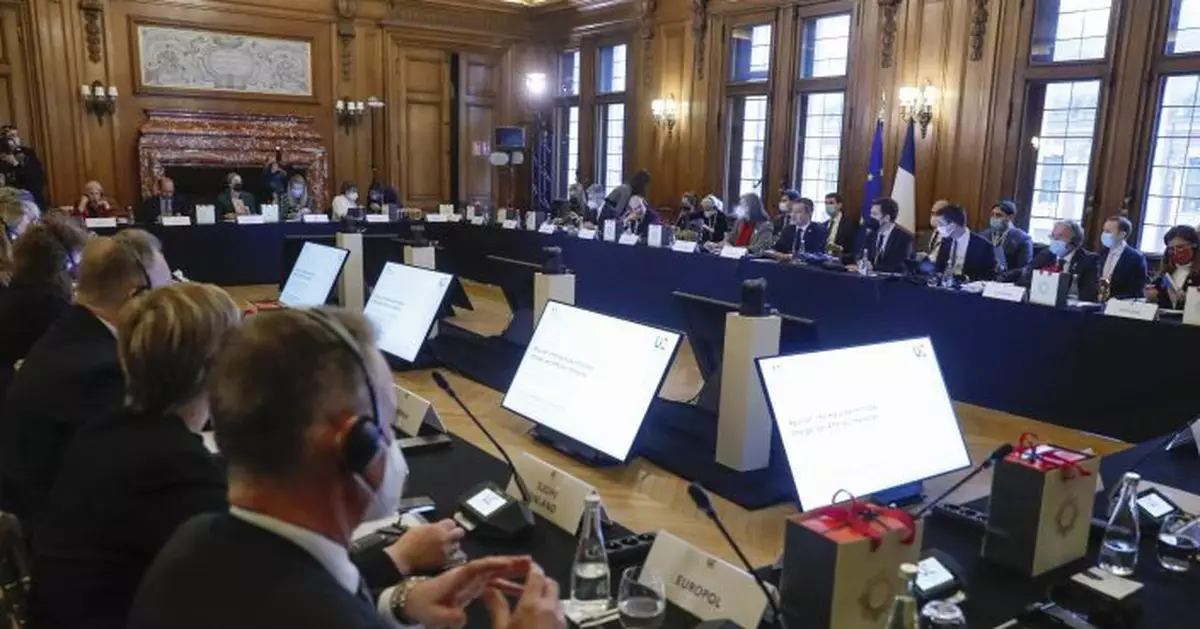European Union interior ministers on Thursday were debating ways to beef up the 27-nation bloc’s borders, including by erecting walls or fences, and examine yet again how to kick-start desperately needed reforms to the EU’s malfunctioning asylum system.
The EU has been mired in a deep political crisis since well over 1 million people, many of them refugees fleeing war in Syria, began entering in 2015. Greece was overwhelmed by migrants landing on its islands on rafts and dinghies from Turkey. Other countries were slow or reluctant to help.
The old asylum system, based on the notion that the country where migrants first arrive must deal with them, collapsed. New reform proposals have failed to overcome the fundamental problem – who should take responsibility and what kind of help other countries should provide.
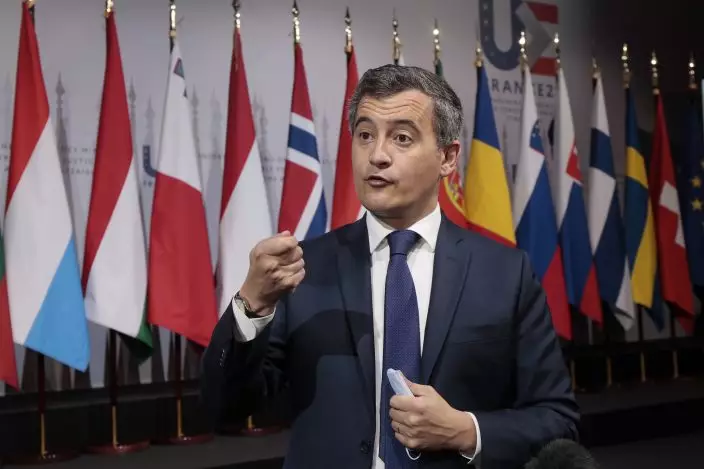
French Interior Minister Gerald Darmanin answers reporters before a meeting of EU's interior ministers, Thursday, Feb. 3, 2022 in Lille, northern France. French President Emmanuel Macron is taking aim at migration — a core issue in the country's presidential campaign — by pushing to strengthen the European Union's external borders against people illegally entering the bloc's passport-free area. (AP PhotoMichel Spingler)
France, which currently holds the EU’s rotating presidency, is trying to reenergize the sweeping reform plan by tackling parts of it at a time.
French President Emmanuel Macron on Wednesday evening met with the interior ministers in a push to “move the issue forward.” Macron acknowledged members states have different views depending on their geographic situation and warned against divisions.
He proposed the creation of a new body, the Schengen Council, that would gather members of the free-passport area to make decisions on migration policies, including preventing difficulties and bringing a quick response in case of crisis.
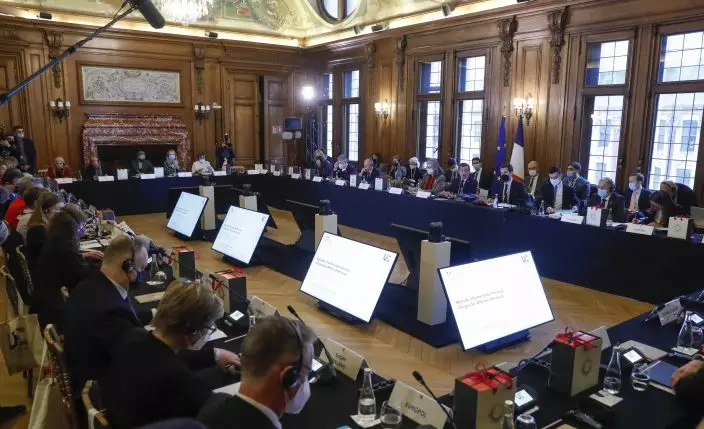
European Union ministers for justice and the interior participate in a meeting, Thursday, Feb. 3, 2022 in Lille, northern France. French President Emmanuel Macron is taking aim at migration — a core issue in the country's presidential campaign — by pushing to strengthen the European Union's external borders against people illegally entering the bloc's passport-free area. (Stephanie Lecocq, Pool Photo via AP)
European Commission Vice President Margaritis Schinas said Thursday “there can be no migration policy at the European level without a significant dimension of border management.”
"We are now working to accelerate our agreement” on both external borders issue and the asylum system at talks in Lille, northern France, he added.
French Interior Minister Gerald Darmanin said he wants all member states to “show support” toward nations where migrants first arrive — whether they are Mediterranean or Eastern European countries.
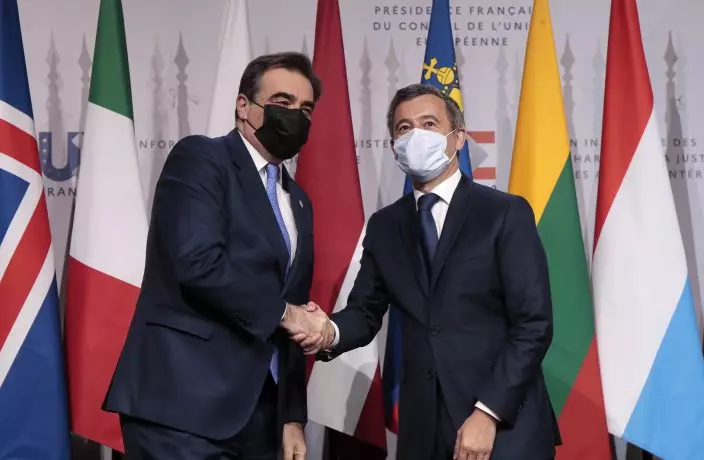
French Interior Minister Gerald Darmanin, right, shakes hands with European Commissioner for Promoting our European Way of Life Margaritas Schinas during a meeting of EU's interior ministers, Thursday, Feb. 3, 2022 in Lille, northern France. French President Emmanuel Macron is taking aim at migration — a core issue in the country's presidential campaign — by pushing to strengthen the European Union's external borders against people illegally entering the bloc's passport-free area. (AP PhotoMichel Spingler)
“They see sometimes massive arrivals of refugees because of the geopolitical instability of the world,” he stressed.
“The idea is to understand difficulties of countries of first entry" in the EU and show "full solidarity” via relocating asylum seekers in other countries or helping them financially. In exchange, they must “record all foreigners who arrive on our soil,” he said.
So far, talk has tended to focus on outsourcing the EU’s migrant challenges to the countries that people leave or transit to get to Europe and on beefing up borders.
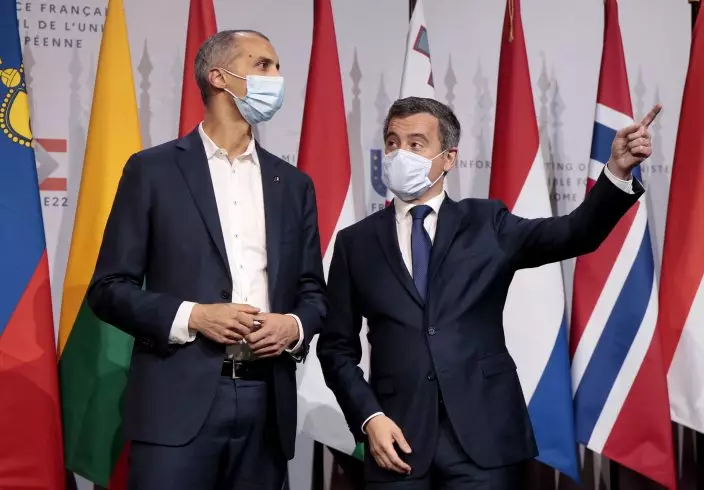
French Interior Minister Gerald Darmanin, right, speaks with Denmark's Minister for Immigration and Integration Mattias Tesfaye during arrivals for a meeting of EU interior ministers, Thursday, Feb. 3, 2022 in Lille, northern France. French President Emmanuel Macron is taking aim at migration — a core issue in the country's presidential campaign — by pushing to strengthen the European Union's external borders against people illegally entering the bloc's passport-free area. (AP PhotoMichel Spingler)
In Lille, the ministers will pick over new proposals to respond to what have been dubbed “hybrid attacks” using migrants, after Belarusian President Alexander Lukashenko invited thousands of people, many of them Iraqis, to Belarus with the promise of helping them to enter Europe.
Lithuania and Poland, notably, are working on border barriers to keep people out, and have also changed their national asylum rules to make it harder for people to stay. The EU’s executive branch, the European Commission, has made a series of proposals that countries can use in an emergency.
In a document laying out national positions on the proposals, which has been seen by The Associated Press, a strong minority of countries favor the use of walls or fences to stop people entering, and some argue that EU money should be used to pay for the barriers.
Denmark, for example, suggests a reference in the reform plans “to the funding opportunities for physical barriers under the Border Management and Visa Instrument (BMVI),” given that the European Council’s legal service “has made it clear that it is possible to fund physical barriers from the EU budget.”
The European Commission, which holds the EU’s purse strings and is responsible for proposing joint legislation and ensuring that the rules are respected, has long opposed the use of European money to fund walls, which several officials have said are not in line with the bloc’s values.
The ministers will also weigh the definition of a new term being added to the EU’s migrant-management lexicon: “instrumentalization.” For the commission, this is when a country “instigates irregular migratory flows” into the EU “by actively encouraging or facilitating the movement” of migrants to the bloc.
Belarus is just the latest case that would fit the definition. In early 2020, at the start of the COVID-19 pandemic in Europe, Turkey allowed thousands of migrants to move through its territory to Greece and Bulgaria, triggering violent clashes at their borders.
The talks in Lille are also likely to focus on another area where the Europeans tend to agree: deportation. On average, only around 40% of people refused entry to the bloc are ever actually sent home.
Follow all AP stories on global migration at https://apnews.com/hub/migration


